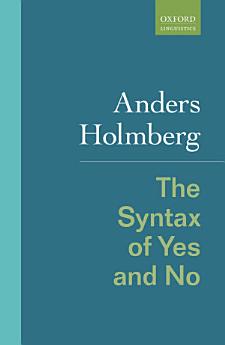The Syntax of Yes and No
२०१५ डिसेम्बर · Oxford University Press
इ-पुस्तक
252
पृष्ठहरू
family_home
योग्य
info
reportरेटिङ र रिभ्यूहरूको पुष्टि गरिएको हुँदैन थप जान्नुहोस्
यो इ-पुस्तकका बारेमा
This book is a cross-linguistic study of the syntax of yes-no questions and their answers, drawing on data from a wide range of languages with particular focus on English, Finnish, Swedish, Thai, and Chinese. There are broadly two types of answer to yes-no questions: those that employ particles such as 'yes' and 'no' (as found in English) and those that echo a part of the question, usually the finite verb, with or without negation (as found in Finnish). The latter are uncontroversially derived by ellipsis, while the former have been claimed to be clause substitutes. Anders Holmberg argues instead that even answers that employ particles are complete sentences, derived by ellipsis from full sentential expressions, and that the two types share essential syntactic properties. The book also examines the related cross-linguistic and intralinguistic variation observed in answers to negative questions such as 'does he not drink coffee?', whereby 'yes' in one language appears to correspond to 'no' in another. The book illustrates how a seemingly trivial phenomenon can have the most wide-ranging consequences for theories of language, and will be of interest not only to theoretical linguists but also to students and scholars of typological and descriptive linguistics.
लेखकको बारेमा
Anders Holmberg received his PhD from Stockholm University in 1987 and is currently Professor of Theoretical Linguistics at Newcastle University, having previously held positions in Morocco, Sweden, and Norway. His main research interests are in the fields of comparative syntax and syntactic theory, with particular focus on the Scandinavian languages and Finnish. His publications include numerous articles in journals such as Lingua, Linguistic Inquiry, Theoretical Linguistics, and Studia Linguistica, and he is the co-editor, with Theresa Biberauer, Ian Roberts, and Michelle Sheehan, of Parametric Variation: Null Subjects in Minimalist Theory (CUP 2010).
यो इ-पुस्तकको मूल्याङ्कन गर्नुहोस्
हामीलाई आफ्नो धारणा बताउनुहोस्।
जानकारी पढ्दै
स्मार्टफोन तथा ट्याबलेटहरू
Android र iPad/iPhone का लागि Google Play किताब एप को इन्स्टल गर्नुहोस्। यो तपाईंको खातासॅंग स्वतः सिंक हुन्छ र तपाईं अनलाइन वा अफलाइन जहाँ भए पनि अध्ययन गर्न दिन्छ।
ल्यापटप तथा कम्प्युटरहरू
तपाईं Google Play मा खरिद गरिएको अडियोबुक आफ्नो कम्प्युटरको वेब ब्राउजर प्रयोग गरेर सुन्न सक्नुहुन्छ।
eReaders र अन्य उपकरणहरू
Kobo eReaders जस्ता e-ink डिभाइसहरूमा फाइल पढ्न तपाईंले फाइल डाउनलोड गरेर उक्त फाइल आफ्नो डिभाइसमा ट्रान्स्फर गर्नु पर्ने हुन्छ। ती फाइलहरू पढ्न मिल्ने इबुक रिडरहरूमा ती फाइलहरू ट्रान्स्फर गर्नेसम्बन्धी विस्तृत निर्देशनहरू प्राप्त गर्न मद्दत केन्द्र मा जानुहोस्।




